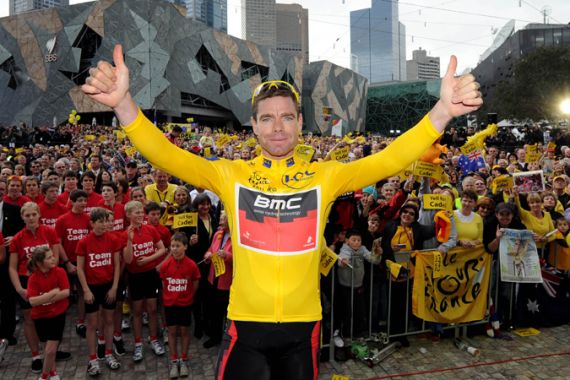‘Cycling now has anti-doping culture’
International Cycling Union president Pat McQuaid says the sport is leading the fight against doping.

 |
| Tour de France winner Alberto Contador is still awaiting a hearing over a failed dope test [GALLO/GETTY] |
The fight against doping is bearing fruit and the sport’s culture has been dramatically changing, the International Cycling Union president said on Saturday.
Thirteen years after the Festina affair rocked the sport, cycling has been the first sport to introduce a test to detect the banned blood-boosting erythropoietin (in 2001) and created the biological passport in 2008, prompting a cultural change, according to Pat McQuaid.
Keep reading
list of 4 itemsSwiss cyclist dies after fall into ravine during Tour de Suisse
Cycling Under Siege in Gaza
Pushing for women’s race, group tackles Tour de France
“Bit by bit, cycling has been changing from a sport which has a doping culture to a sport which has an anti-doping culture,” the Irishman told a press conference at the world championships, which end on Sunday with the men’s road race.
“The UCI is seen as a reference in the fight against doping now. The sport of cycling is seen in many ways as a pioneer in the fight against doping.”
In addition, cycling introduced earlier this year a ‘no needle policy,’ also enforced by the international rowing
federation, with the International Olympic Committee implementing the regime for the 2012 London Games.
UCI anti-doping manager Francesca Rossi said that over 21,000 tests had been conducted since the introduction of the biological passport.
Targeted testing
Since January 2008, the UCI has been collecting blood samples from all professional riders to create a medical
profile, or passport, to be compared with data registered in doping tests.
“As of today, 955 riders are part of our testing pool – compared with 848 last year,” Rossi said, adding that priority was now given to targeted testing as opposed to extensive testing.
“We are now doing intelligent testing – which does not mean we were stupid,” she explained.
“We target the riders we believe need to be more tested than others.”
|
“The strategy we want to undertake in the coming months and years is that the UCI does everything it has to do in anti-doping and catches the cheats when cheats are to be caught and gets them out of the sport” Pat McQuaid |
The biological passport has helped ban riders who manipulated their blood although they did not actually fail a dope test.
This year, the Court of Arbitration for Sport (CAS) overruled decisions by the Italian National Committee and the Olympic Committee of Slovenia to clear Franco Pellizotti and Tadej Valjavec respectively, banning the two riders for two years.
McQuaid, who said Alberto Contador’s hearing before the CAS over a failed dope test last year should go on according to schedule in November, believes the atmosphere surrounding cycling has been sounder.
“The strategy we want to undertake in the coming months and years is that the UCI does everything it has to do in anti-doping and catches the cheats when cheats are to be caught and gets them out of the sport,” he said.
“That’s the way it should be. We’ve had big dramas in the past few years but I don’t see that continuing in the future.”
All the 570 tests carried out on the Tour de France, a record number, were negative, Rossi said, as well as the 511 from the Giro d’Italia.
Results from the 537 tests from the recent Vuelta were still awaited, Rossi added.